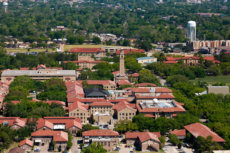Observations on the 28th Annual Eric Voegelin Society Meeting

The 28th annual meeting of the Eric Voegelin Society was held, for the first time, on the campus of Louisiana State University–an appropriate venue, where Voegelin held the distinguished title of Boyd Professor for sixteen years.Society members held invigorating discussions on an array of topics, which were thematically joined around the roles of mysticism, faith, and noetic reason within political philosophy. The meeting made clear to this observer that the defense and future of civilization is indeed staked upon these aspects of the human experience.
Ellis Sandoz began the day with the reminder that Eric Voegelin did not seek, and resisted taking on, disciples. Indeed, a Voegelinian disciple–one who makes himself a dogmatic follower of Eric Voegelin–would be no true Voegelinian. Sandoz asserted that experiencing the “leap in being” is the critical aspect of such a leap, that the perception of a transcendent order, however faint or dependent upon faith as the vassal of empirical observation, is that which grounds mystic claims securely within actual real-world existence. Society members did an exceptional job as the day progressed, of articulating the prominence of real-world experience and of explaining the ideological dangers associated with the closure of the soul to faith and noetic reason.
Some Interesting Papers from Syse, Segrest, and the Coreys
Henrik Syse delivered one of the day’s strongest presentations, arguing that the use of nous as a credible aspect of real-world experiences is a conceptually untenable prospect for many living in the 21st century, and that it is the duty of scholarship inspired by Voegelin to take seriously the idea of formulating or conceptualizing the idea of noetic reason in a way that will not be rejected out-of-hand by those of us who do not already read Eric Voegelin’s works.
Syse is tapping into what is perhaps the most critical scholarly question facing the Eric Voegelin Society. The idea of noetic reason is derisively ridiculed in too much of academia; one very influential political theorist recently suggested to me that nous is nothing more than “paranormal insight or speculation.” We are of course not the Ghost-Busters; and something indeed must be changed about the perception of nous in academic circles. Syse’s presentation inspired thought on how, precisely, this reformulation might unfold.
Scott Segrest also delivered an interesting paper that may have some positive recommendations regarding how nous can be better understood along common-sense lines in the 21st century, but for this I will make the reader wait, as Segrest’s piece will appear at VoegelinView in the Spring of 2013. Another interesting paper examined faith in Catholicism, and still others explained through some interesting anecdotes that common individuals can indeed experience nous.
The dangers of ideology, on the other hand, were well articulated by David Corey, who is working on a very interesting manuscript with Elizabeth Corey. David and Elizabeth Corey have analyzed the main antagonists of ideology in the twentieth century and allowed the Society an introduction to their analysis of Voegelin that will be included in their book. Among the interesting suggestions offered by Corey was the assertion that Voegelin basically argues, “no Christianity, no ideology.”
This was an interesting observation, and contrasted with many of the assertions throughout the day by presenters, namely, that the Christian experience of faith is among the tools within the soul that combat ideology. A heated discussion followed the Corey presentation, the crescendo occurring with Sandoz reminding the room that intellectuals would do well to avoid the pitfalls of such false dichotomies.
The use or Abuse of Voegelin?
Sandoz’s warnings against disciples and false dichotomies were nicely illustrated by two conclusions drawn by two different presenters during the day. Manfred Henningsen argued that Voegelin likely would have endorsed a recent ruling by a German court that upheld restrictions against the religious practice of circumcision. Meanwhile, Paul Beir posited that Voegelin would have endorsed the ruling in Lawrence v Texas that struck down state-level restrictions on sodomy.
Henningsen and Beir draw their very different conclusions for very different reasons, both of which are indeed, at least arguably, buttressed by Voegelin’s ideas: the propriety of law and order sustains the Henningsen conclusion, while the propriety of the individual’s soul inspired Beir’s conclusion. Suffice it to assert here: I doubt that they are both correct in their speculations. Henningsen and Beir, however, demonstrate Sandoz’s point nicely, and Voegelinians need not resolve the ostensible conflict between their positions.
I am, therefore, happy to report that the watchmen are vigilant. The subject matter of some of our discussions, however–the fact that the Eric Voegelin Society finds itself mulling over laws regarding sodomy and circumcision–highlights the urgency of our little meetings, and the urgency invoked by our mantra: “Defend Civilization!”




